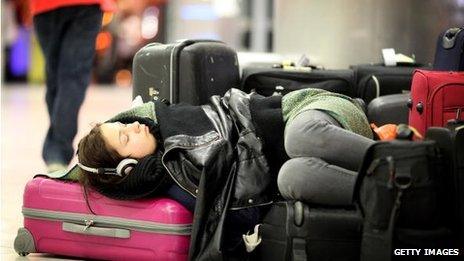EU unveils new air passenger rights
- Published
- comments

New rules should make it easier for passengers to complain about delays and cancellations
New rights for airline passengers have been unveiled by the European Commission.
They include rerouting travellers with rival carriers if a flight is delayed for more than 12 hours.
The rules also clarify what are considered exceptional circumstances for compensation.
For example, mechanical failures on board the aircraft do not count, but natural disasters and traffic control strikes do.
The Commission says the new rules, which are not likely to become law until 2014, will give a lot more certainty to airlines and passengers.
"It is very important that passenger rights do not just exist on paper," said EU transport commissioner Siim Kallas.
"We all need to be able to rely on them when it matters most - when things go wrong."
He added: "We know that the real priority for stranded passengers is just to get home. So our focus is on information, care and effective rerouting."
For this reason, airlines have been given more time to solve any problems, so as to encourage them to not to cancel the flight.
During the Icelandic ash cloud crisis in 2010, when no flights could take off in Europe for several days, there was much confusion about how much responsibility the airlines should carry for the welfare of its passengers.
Some airlines were initially very reluctant to cover passengers' costs, but threats from the European authorities brought them into line.
There have also been some concessions to industry. Under the planned measures, airlines will have to pay for a maximum of three nights' hotel accommodation - although this does not apply to passengers with reduced mobility, unaccompanied children or pregnant women.
'Frustrated' passengers
"Critics from both consumer groups and industry have been vociferous in their concerns about the interpretations of the rules," says aviation expert Steven Truxal from City University.
"At times, they are seen as divergent, lacking certainty and therefore contributing to the confusion around air passenger rights and air carrier liability."
Some observers go further. "They [the Commission] haven't tackled the big problem, which is that airlines will continue to misrepresent what the rules actually are and dodge their obligations. They haven't said what will happen to the airlines," said Simon Calder, travel editor at the Independent.
"Until they make sure that they get the enforcement right, there's not a lot point bringing lots of extra new rules in," he added.
The European Consumer Centre agrees that it can be a difficult process for customers getting compensation.
"National enforcement bodies work differently. Some mediate to reach an agreement and some give recommendations to airlines, but they are not binding," says Laura Fergusson, consumer adviser at the UK European Consumer Centre.
"Quite often, airlines ignore these recommendations. Then consumers have to consider legal proceedings."
The Commission also wants complaints to be dealt with more promptly. "The main problem for passengers is that, while they have very strong passenger rights defined under EU law, they can have difficulty claiming them and feel frustrated when air carriers do not appear to apply them," it said in a statement explaining the rules.
It wants to make it a requirement for airlines to acknowledge receipt of a complaint within a week and provide a formal reply within two months.

Natural disasters such as the ash cloud will count as extraordinary circumstances
Tarmac delays
A survey carried out in Denmark showed that just 2-4% of passengers entitled to financial compensation received it.
And if a plane is boarded and sits on the tarmac for more than five hours, passengers will have the right to demand to be let off. If the tarmac delay is more than an hour, the airline must provide air conditioning, use of toilets and water.
Other changes include:
Financial compensation to be triggered after a minimum five-hour delay (currently stands at three) on any flight within the EU or international flight shorter than 3,500km
For longer international flights, compensation will be due after a delay of nine hours up to 6,000km and after 12 hours for longer journeys
Airlines will also be required to inform passengers about delays and provide an explanation no later than 30 minutes after the scheduled departure time
Carriers no longer able to charge for correcting misspelt names on tickets
Musicians allowed to bring smaller instruments into the cabin, while there must be clear terms and conditions for transporting larger instruments in the cargo hold.
Some analysts argue that this will eventually mean higher costs for customers.
"Ultimately passengers will pay for these new rules, because the profit margins of carriers are too thin to absorb the cost of major unforeseen events," said Dr Ashley Steel, KPMG's global chair for transport.
"In some situations, the cost to the airline in ensuring a passenger is not left stranded after a 24-hour delay could be four times the ticket value," he added.
The proposals are subject to approval by member states and the European Parliament. They apply only to European airlines.
- Published13 March 2013
- Published12 March 2013
- Published13 March 2013
- Published31 January 2013